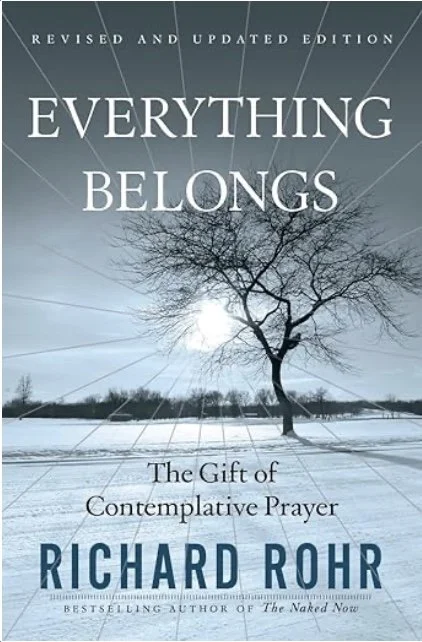Five-step Daily Examen
This is a version of the five-step Daily Examen that St. Ignatius practiced and taught in the 1500s. He invited us to find God in all things - which means paying careful attention to how the Spirit is moving in each moment of our daily lives. We have to take a magnifying glass to the seemingly ordinary, seeking to encounter the Divine.
Many versions are used by the Society of Jesus or Jesuits (founded by St Ignatius of Loyola). This is a simple version that can be practised at the end of each day before you go to sleep.
1. Become aware of God’s presence.
Sit quietly and go inwardly to a place of peace.
Practising a meditation or mindfulness exercise may be helpful to centre mind and heart.
Picture God’s Holy Spirit being present with you.
2. Review the day with gratitude.
Replay the events of the day in your mind… people you met, things that happened, sites you saw… interactions with those you love… moments of light and life.
Review the day with gratitude.
Thank God.
3. Pay attention to your emotions.
Think back over your day, noting the joys and delights, moments of irritation or perhaps sadness.
Was there something that particularly touched you? Moved your spirit in some way?
4. Where did God show up? Choose one feature of the day and pray from it.
Sit with that moment … relive it… notice the feelings and thoughts.
Was God trying to say something to you? An insight?
Give thanks.
5. Look toward tomorrow.
Think about what’s on the agenda for tomorrow.
What opportunities might tomorrow hold?
Pray for awareness … that you will notice God showing up … and for wisdom in being able to appreciate and express love.
“God comes to us disguised as our life”
Fr Richard Rohr in his book Everything Belongs: The Gift of Contemplative Prayer says:
Why didn’t someone tell me that earlier — that this life is the raw material that I need to take seriously?
Every day, what’s right in front of me is the agenda. And even more, the natural world all around us has all the lessons that we need for life, love, death, and salvation. Really! Just look and listen, and note how Jesus himself seems to have looked and listened to lilies, birds, hens, sheep, “red sky in the morning,” green and dry wood, moth and worm, etc.
You can see how merely believing doctrines and practicing rituals is very often a clever diversionary tactic to avoid my actual life—to avoid the agenda that is right in front of me every day, which is always messy, always muddy, always mundane, always ordinary—and all around me.
From Simple Faith by Margaret Silf:
I was once sitting in a little park in the small town of Loyola in Spain. Behind me was the imposing basilica of St. Ignatius, who was born there. Its edifice at that time was covered in scaffolding and under renovation. In front of me was a small kiosk selling newspapers, chocolate, and other small items.
A man came along with his small daughter and their dog. The man bought a newspaper for himself and a little container of soap bubbles for his daughter to play with. They sat down beside me. The man was engrossed in his newspaper. The little girl was delightedly blowing bubbles, clearly entranced by the magical coloured globe that each bubble formed as it caught the sunlight.
The dog jumped up after every bubble and tried to catch it, but as soon as he seized the bubble with his snout, the bubble burst. I asked myself, “Which is teaching me more about the kingdom of God—the mighty basilica with all its scaffolding or this little girl’s joy at the beauty of the world reflected in her bubbles?” The little dog was a reminder that as soon as we try to take hold of the mystery and pin it down into our own categories, words, and meanings, we destroy it.
“Which is teaching me more about the kingdom of God - the mighty basilica with all its scaffolding or the little girl’s joy at the beauty of the world reflected in her bubbles?”
– Margaret Silf
✨ Core Themes
1. God in All Things
St. Ignatius, the founder of the Jesuits, taught that "God is in all things." This foundational belief means that every moment — joyful, mundane, or painful — can reveal God if we are attentive.
“Finding God in all things” doesn’t mean all things are good — but that God can speak through all things: creation, relationships, dreams, desires, even suffering and failure.
2. Desires as God’s Voice
St. Ignatius believed that our deepest, most authentic longings — those that draw us toward love, truth, and generosity — are places where God speaks.
Not every desire is holy, of course. Discernment is key.
But beneath surface cravings, there are holy desires — for wholeness, purpose, connection, and service — that reflect the divine image in us.
Fr. James Martin, in The Jesuit Guide to (Almost) Everything, writes:
“Ignatian spirituality reminds us that our deepest desires are not to be feared, but honored, for they can be places of encounter with God.”
3. God Comes to Me Disguised as My Life
This beautiful phrase suggests:
Your life is not a distraction from the spiritual path — it is the spiritual path.
The ordinary is sacred.
God doesn’t just live in churches or scripture, but in your body, your work, your relationships, your longings, your limitations, your story.
Five ways to live more fully into this way of seeing and being:
1. Practice the Examen (Daily Reflection)
Where did I feel most alive, connected, or loved today?
Where did I feel disconnected or disheartened?
What do these moments reveal about God’s movement in my life?
This builds the habit of noticing God in your lived experience, not outside of it.
2. Pay Attention to Your Desires
Ignatius would say these are clues to your vocation and True Self.
What do I really long for beneath my daily wants?
What kind of life would bring me peace and help others flourish?
What inner desire keeps surfacing — gently, persistently — and might be God's invitation?
3. Sacramentalize the Ordinary
Turn everyday experiences into sacred encounters:
A conversation with a friend
A moment of laughter
Watching a tree sway in the wind
Try whispering: “God is here too.”
4. Hold Life with Reverence, Not Judgment
When things are messy or unclear, instead of asking “Why is this happening?”, try:
“How might God be present in this?”
This posture doesn’t deny pain but lets grace in — slowly, gently, through trust.
5. Live with Curiosity and Trust
Adopt a stance of holy curiosity:
“What is God trying to show me in this season?”
“How might this desire or frustration be leading me closer to my deepest truth?”
“Can I trust that even in darkness, God is quietly present?”
🙏 Closing Thought
To believe that “God comes to me disguised as my life” is to honor that:
You don’t need to become someone else to find God.
You don’t need to escape your life to grow spiritually.
You only need to awaken — slowly, attentively — to the mystery already present in your lived experience.




